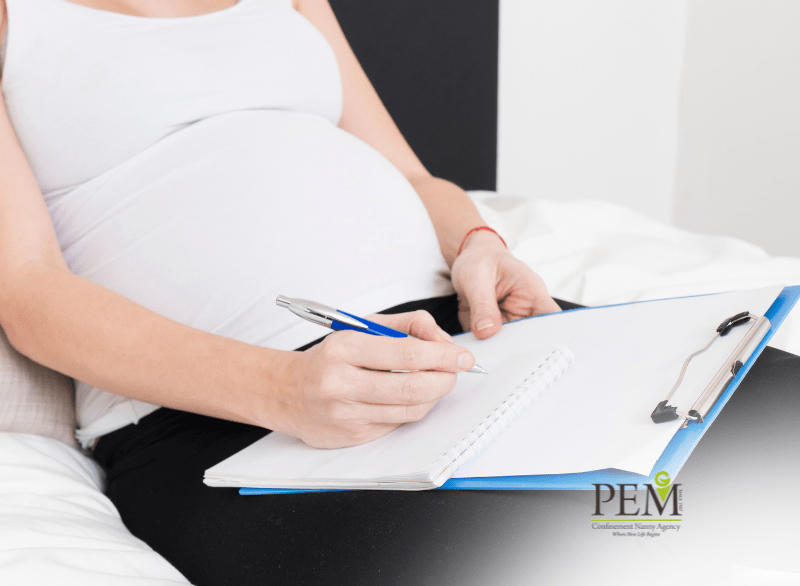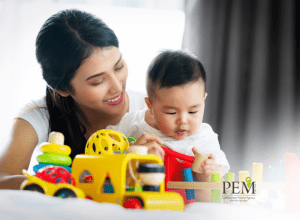[email protected] ♦ (+65) 6293 9249 ♦ Mon - Sun : 10:00AM - 7:00PM
Things to Prepare in the Third Trimester

Yay—you’re at the last stage of pregnancy and your due date is fast approaching! Feels like a blink of an eye, doesn’t it? We totally know how that feels! What felt so long and far a few months ago now almost feels like it’s coming at you at the speed of light. Fret not, if you need to make a quick check of what else should you prepare at this point, this blog is written for you!
What to Pack in Your Hospital Bag
This is an important element of your hospital stay – you’re not leaving and coming home without this! Everything that you may need before, during, and after labour will be packed in this, so it is best to stay prepared and make a list of the necessities. The earlier you start, the better.
First, make different lists for yourself and your soon-to-arrive newborn. As the early stage of labour can take very long hours, your spouse may want to come up with their own list as well so they can feed themselves or keep themselves busy while keeping you company.
Among the items you’d want to make sure you’ll have in the bag are the important documents, charges for your devices, maternity pads, toiletries, and breastfeeding-friendly clothes. For a more detailed list, check out our Ultimate Hospital Bag Checklist & More Before Your EDD!
Planning for the Arrival of Your Baby
Somehow, time seems to fly and you’re already halfway through your third trimester. Or is it? Either way, you’re definitely closer to the end and it’s best that you know exactly what’s coming your way. Preparations are always made in such a way to ensure that you and your baby have everything that they need for the most comfortable and safe journey. However, like any normal human being, pregnancy poses a challenge for even the best planner.
Don’t panic and sort everything out one by one. You can start by listing down everything on your hands and discussing it with your partner. At this point, some things you wouldn’t want to miss out on are matters like your newborn’s nursery, bedding, and clothes, legal matters, and preparations for yourself as a to-be breastfeeding mom.
Tips for Caring for Yourself and Your Baby After Birth
After birth, both self-care and newborn care are equally important. You’ll be in the crucial stage of postnatal recovery and your newborn is in their first few days and weeks after birth. This is why the confinement period, which usually lasts for approximately a month after birth, is known as the golden period. During this time, rest is important for you to ensure smooth postpartum recovery. You would also have to stabilise breast milk so that your infant is well-fed at all times.
If you are a first-time parent with no experienced family members around, it’s worth looking into a confinement nanny agency such as PEM to find out what kind of services would you need at this stage. What can a confinement nanny do for you?
At PEM confinement nanny agency, for example, our nannies are professionally trained to prepare daily confinement meals, herbal tonics and red dates, and confinement baths for mothers. Their duties revolve around both mom and baby, so they would also help with newborn care duties such as bathing, burping, and taking over the nighttime feeding. Our confinement nanny will also guide a mother on breastfeeding and support her extensively, including sharing tips on how to relieve engorgement.
Breastfeeding Tips and Tricks
Do you plan on breastfeeding? If you do, you’d have to equip yourself with nursing skills and knowledge so you’ll at least know what to expect when the time comes. You can join any local breastfeeding support group where mothers often share tips and tricks that work for them. Different things work for different people, so don’t get discouraged when the first few things don’t work for you. Keep trying and you’ll soon find your solution!
In Singapore, the common help breastfeeding mothers would go for are confinement nanny, lactation massage therapist, and lactation consultant. Depending on your preference, you can approach any of these services to make breastfeeding better and easier for yourself.
Finances and Insurance for New Parents in Singapore
The first few months of your child’s life can be pretty expensive. On top of the new insurance and other legal matters, this is the time when you’ll know which sizes of clothes fit your baby, and which bottle and formula milk would be accepted by them. It can take several tries of different brands and if you child completely rejects one thing after another, there will likely be minor wastage here and there.
The good news is, Singapore offers various financial aid for parents to help reduce your burden as you plan to welcome your new family member. For instance, you can check out the Child Development Account (CDA) under the Baby Bonus Scheme. For any amount you put into your child’s account, the government will match every single dollar and add to it! There are also different aids available for single parents to make sure that raising a child can be less financially taxing for them.
Keeping Postpartum Depression at Bay
Did you know that the effects of postpartum depression could last for years after you give birth? It can affect not only yourself but also the people around you including your growing child. If left untreated, your child can potentially end up growing in a broken household. This is why it’s especially crucial to draw the link when things get overwhelming and get help as soon as possible when you feel that you are getting consumed by it. Whether it’s the first child or the second, postpartum depression remains a big problem and should be taken seriously.
According to research, 25% of women get postpartum depression after the first birth. Most women have mild to moderate depression after giving birth. Some, unfortunately, have severe postpartum depression. To know what to expect, ask for a postpartum depression test. Ask your doctor to check for PPD if you’ve ever had anxiety or depression in the past.
It is normal to cry at night and get teary when things aren’t going your way. But if you are crying for no apparent reason, please seek professional help right away. Having a support system can go a long way too.
Conclusion
Hopefully this could help you prepare for labour, delivery, and the postpartum period. With so much to do, the third trimester can seem overwhelming for a lot of us! When uncertain what to do, make sure to ask for help or advice from those are skilled and experienced in postpartum and newborn care. Having a confinement nanny Singapore mothers would usually have as companions would be especially helpful as well.







